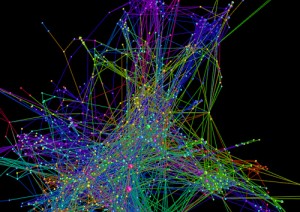 Più uso Internet, più mi affascinano le reti, perché si comportano in modo inaspettato, controintuitivo. L’ordine sembra emergervi dal caos in modo quasi magico. Considerate il web: grandi masse di persone che non si conoscono, prive di strutture di comando e di professionalità nel produrre e gestire informazione, dovrebbero dare luogo a una specie di blob, no? E invece, infallibilmente, persone e contenuti finiscono per autorganizzarsi in modo da essere a pochi clicks (spesso uno solo) le une agli altri. Costruire una mappa esaustiva di Internet è impossibile, ma trovarvi qualcosa è abbastanza facile. È come mettere una mano nel proverbiale pagliaio e tirarne fuori un ago al primo tentativo, tutte le volte che cerchiamo un ago.
Più uso Internet, più mi affascinano le reti, perché si comportano in modo inaspettato, controintuitivo. L’ordine sembra emergervi dal caos in modo quasi magico. Considerate il web: grandi masse di persone che non si conoscono, prive di strutture di comando e di professionalità nel produrre e gestire informazione, dovrebbero dare luogo a una specie di blob, no? E invece, infallibilmente, persone e contenuti finiscono per autorganizzarsi in modo da essere a pochi clicks (spesso uno solo) le une agli altri. Costruire una mappa esaustiva di Internet è impossibile, ma trovarvi qualcosa è abbastanza facile. È come mettere una mano nel proverbiale pagliaio e tirarne fuori un ago al primo tentativo, tutte le volte che cerchiamo un ago.
Più studio le reti e più mi sorprendono per la loro capacità di organizzare l’informazione, apparentemente senza nessuno sforzo. Leggere la storia dell’esplorazione scientifica delle reti sociali dà quasi le vertigini. Stanley Milgram affida a cittadini americani scelti a caso lettere per altri cittadini americani, sempre scelti a caso, e un numero sorprendente di esse arriva a destinazione in pochi passaggi (i famosi sei gradi di separazione). Mark Granovetter scopre che i conoscenti casuali sono più efficaci degli amici intimi e dei familiari nel trovarci lavoro . Fredrik Liljeros studia le reti di rapporti sessuali e conclude che un piccolo numero di persone molto promiscue impedirà la scomparsa dell’AIDS. Nathan Eagle predice la prosperità delle comunità locali a partire da come i suoi abitanti dividono il tempo che passano al telefono (gli abitanti delle comunità più povere passano una quota alta del proprio tempo di chiamata con una o poche persone). Tutti questi risultati sembrano indipendenti dalle persone che compongono le reti: in quasi tutti i modelli i nodi sono identici tra loro. L’unica cosa che li distingue – e che genera le proprietà straordinarie dei modelli – è la struttura dei links. Roba che sembra uscita da un corso di laurea, sì, ma di Hogwarts.
Mi sono convinto che le proprietà delle reti possano contribuire a spiegare molti fenomeni di cui facciamo esperienza quotidiana, ma che non capiamo – e che spesso ci danno ansia. Perché abbiamo la sensazione di essere circondati da imprenditori di successo brillanti e creativi (sebbene numericamente queste persone non siano poi tante)? Perché il file sharing in peer-to-peer ha messo alle corde l’industria musicale? Perché Wikipedia funziona così bene?
Il mio Sacro Graal è di domare le reti sociali online, forgiandole in uno strumento potente e preciso per progettare e attuare le politiche pubbliche. L’ho già fatto con Visioni Urbane e Kublai, ma ho dovuto fare molte scelte sulla base del mio istinto. È andata bene, ma perché questo diventi un metodo generalizzabile ho bisogno di capirne molto, molto di più. E quindi studio la lingua delle reti: in questo periodo vado spesso all’European University Institute di Firenze per frequentare il corso di Complex Social Networks di Fernando Vega-Redondo. È un po’ dura (mi alzo alle cinque del mattino, perché Fernando fa quasi sempre lezione alle 8.45 precise), ma pazienza. Io questa cosa la devo assolutamente capire.